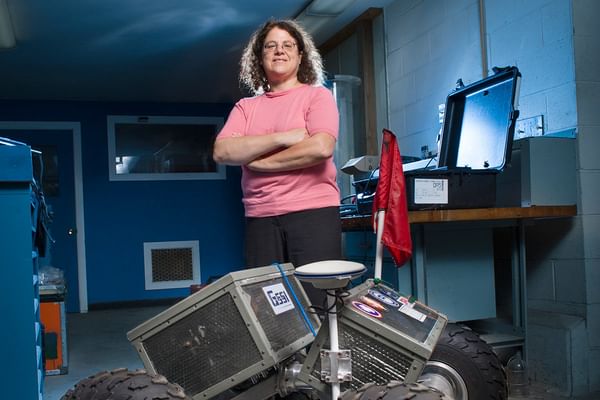- Undergraduate
Bachelor's Degrees
Bachelor of ArtsBachelor of EngineeringDual-Degree ProgramUndergraduate AdmissionsUndergraduate Experience
- Graduate
Graduate Experience
- Research
- Entrepreneurship
- Community
- About
-
Search

Laura Ray
Myron Tribus Professor of Engineering Innovation
Senior Associate Dean, Faculty Development

Professor Ray's NASA and NSF-funded research includes developing autonomous robots to study remote polar regions.
Research Interests
System dynamics and controls; robotics; machine intelligence; agricultural robots
Education
- BSE, Mechanical and Aerospace Engineering, Princeton University 1984
- MSE, Mechanical Engineering, Stanford University 1985
- PhD, Mechanical and Aerospace Engineering, Princeton University 1991
Awards
- Outstanding Service Award for Faculty, Dartmouth Engineering (2022)
- Senior Member, National Academy of Inventors (2020)
- Dartmouth Technology Innovation and Commercialization Award (2019)
- American Society for Non-destructive Testing Fellowship (2001)
- Ralph R. Teetor Educational Award, SAE (1997)
Professional Activities
- Member, American Society of Mechanical Engineers
- Member, Institute of Electrical and Electronics Engineers
Research Projects
-
Acoustics and signal processing
Acoustics and signal processing
Acoustics and signal processing research focuses on active noise control and distributed sensing. Active noise control reduces noise in hearing protection and communication systems to reduce noise induced hearing loss and to enhance the ability to communicate. Distributed sensing research uses signal processing to focus listening in a specified direction. This research blends mechatronics—the design of mechanical and electrical systems—with high performance signal processing and control algorithms to improve communication in noisy environments.
-
Robot design and smart navigation
Robot design and smart navigation
Robot design and smart navigation focuses on developing affordable robot designs that employ "smart navigation" for path planning and mobility in extreme terrain, rather than complex and expensive vision systems. We are developing solar-powered robotic platforms for deploying scientific instrumentation over hundreds of kilometers in Arctic and Antarctic regions. These robots employ proprioceptive sensors to determine whether difficult terrain is passable, and if not, to navigate around such terrain.
-
Terrain identification
Terrain identification
Terrain identification research focuses on using small, lightweight robots to classify, characterize, and identify terrain properties necessary to predict mobility of these vehicles on the terrain. Terramechanics models for heavy vehicles are well understood, but similar comprehensive models do not exist for lightweight (sub-500 kg) vehicles. We are developing terrain models and modeling tools that can be used to asses mobility on a given terrain, while avoiding maneuvers that cause immobilization. We seek to integrate terrain identification and traction/stability control of the robots in order to allow autonomous or remote control of these robots at the maximum attainable speeds and accelerations achievable on the terrain.
-
Cooperative control of multi-robot systems
Cooperative control of multi-robot systems
Cooperative control of multi-robot systems focuses on modeling and control of groups of high-speed mobile robots while accommodating communication latencies and nonlinear vehicle dynamics. In distributed cooperative control, robots communicate information about their state to each other; communication latencies and error depends on the amount of information communicated and the number of robots. We are developing distributed control system modeling and design tools that seek to maximize control bandwidth for a given information set. These tools will also assist in assessing the value of information transmitted in maintaining stability and performance of group dynamics. Both potential function path planning and control and predictive control methods are being developed.
Selected Publications
- Kursav MN, Pauls SD, Bonfert-Taylor P, Loeb L, Ray L. (2025) "Accelerating Change of Practice Through Targeted Professional Development in Data Science." Journal of Statistics and Data Science Education. 1–25. https://doi.org/10.1080/26939169.2025.2479012.
- Gronewold A, Mulford P, Ray E, Ray L. (2025) "Tactile Sensing & Visually-Impaired Navigation in Densely Planted Row Crops, for Precision Fertilization by Small UGVs." Computers and Electronics in Agriculture. 231.
- Lines A, Elliott J, Ray L. (2022) "Incipient Immobilization Detection for Lightweight Rovers Operating in Deformable Terrain." ASME Journal of Autonomous Vehicles and Systems. https://doi.org/10.1115/1.4056408.
- Hamlin A, Ray L, Kobylarz E, Lever JH, Taylor S. (2021) "Assessing the Feasibility of Detecting Epileptic Seizures Using Non-Cerebral Sensor Data." Computers in Biology and Medicine. 130: 104232.
- Ray L, Jordan M, Arcone SA, Kaluzienski LM, Walker B, Koons PO, Lever JH, Hamilton G. (2020) "Velocity Field of the McMurdo Shear Zone (MSZ) from Annual Ground Penetrating Radar Imaging and Crevasse Matching." Cold Regions Science and Technology. 103023.
Patents
Videos
A Decade of Challenges and Progress for Polar Robots
Graduate Student Engineering Research: Polar Ice Research - Cool Robot
Graduate Student Engineering Research: Yeti Robot
Graduate Student Engineering Research: Psychoacoustics
Cooperative Robots
Professor Laura Ray on the Luce Graduate Fellowships
Yeti Robot with Tucker Sno-Cat
News











In the News
Concord Monitor
Dartmouth Students Win NASA Challenge With Lunar Rover Built in a Garage
Jan 28, 2021
Dartmouth Students Win NASA Challenge With Lunar Rover Built in a Garage
Jan 28, 2021
The Washington Post
High-tech 'Yeti' may revolutionize exploration near North and South poles
Mar 12, 2013
High-tech 'Yeti' may revolutionize exploration near North and South poles
Mar 12, 2013
Popular Mechanics
Yeti and "Cool Robot," the Rovers Tough Enough to Explore Greenland's Ice Sheet
Jul 26, 2011
Yeti and "Cool Robot," the Rovers Tough Enough to Explore Greenland's Ice Sheet
Jul 26, 2011













